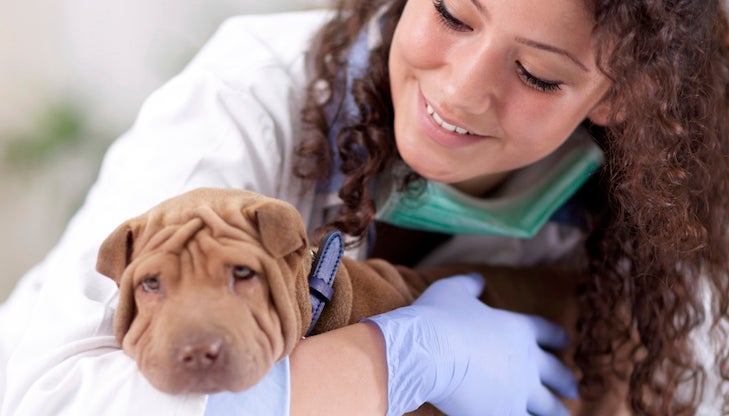
AKC is a participant in affiliate advertising programs designed to provide a means for sites to earn advertising fees by advertising and linking to akc.org. If you purchase a product through this article, we may receive a portion of the sale.
Taking your pet to the vet for all their vaccinations and boosters might seem like a chore. But in fact, these visits can be life-saving. The diseases that these vaccines protect our pets from are potentially deadly and largely preventable.
Always discuss vaccine schedules with your vet, since not all dogs need every vaccination. But to let you know why vaccinations are important, here are descriptions of the diseases and bacteria that dog vaccines will help your pet avoid.
Bordetella Bronchiseptica and Kennel Cough
Bordetella bronchiseptica is a highly communicable bacterium that causes severe fits of coughing, vomiting, and, in rare cases, seizures and death. Both injectable and nasal spray vaccines are available.
Bordetella bronchiseptica is the primary cause of the contagious disease kennel cough. Also known as infectious tracheobronchitis, kennel cough results from inflammation of the upper airways. It can be caused by bacterial or viral (such as bordetella and canine parainfluenza). Kennel cough often involves multiple infections simultaneously.
Usually, the disease is mild and self-limiting, causing bouts of harsh, dry coughing, sometimes severe enough to spur retching and gagging, along with a loss of appetite, but in rare cases it can kill. It is easily spread between dogs kept close together, which is why it passes quickly through kennels. Antibiotics are usually not necessary, except in severe, chronic cases. Cough suppressants can make a dog more comfortable.
Canine Distemper
Canine distemper is a virus that attacks the respiratory, gastrointestinal (GI), and nervous systems of dogs, wild canids, raccoons, skunks, and other animals. It causes discharge from the eyes and nose, fever, coughing, vomiting, diarrhea, seizures, twitching, paralysis, and, often, death. There is no specific drug to treat the virus, but you can treat the symptoms. This will also give the dog’s immune system a chance to fight off the virus.

Canine Hepatitis
Canine hepatitis is a disease of the liver caused by a virus that is unrelated to the human form of hepatitis. Symptoms range from a slight fever and congestion of the mucous membranes to severe depression, vomiting, jaundice, stomach enlargement, and pain around the liver. Many dogs can overcome the mild form of the disease, but the severe form can kill. There is no cure, but doctors can treat the symptoms.
Canine Parainfluenza
Canine parainfluenza is one of several viruses that can contribute to kennel cough.
Canine Coronavirus
Canine coronavirus isn’t the same virus that causes COVID-19 in people. Canine coronavirus usually affects dogs’ gastrointestinal systems, though it can also cause respiratory infections. Signs include most GI symptoms, including loss of appetite, vomiting, and diarrhea. Doctors can keep a dog hydrated, warm, and comfortable, and help alleviate nausea, but there is no drug that kills coronaviruses.
Leptospirosis
Unlike most diseases on this list, leptospirosis is caused by bacteria and sometimes presents no symptoms at all. When symptoms do appear, they can include fever, vomiting, abdominal pain, diarrhea, loss of appetite, severe weakness, depression, stiffness, muscle pain, or infertility. Antibiotics are effective, but the sooner they are given, the better.

Parvovirus
Parvovirus attacks the gastrointestinal system and creates a loss of appetite, vomiting, fever, and often severe, bloody diarrhea. Extreme dehydration can come on rapidly and kill a dog within 48 to 72 hours, so prompt veterinary attention is crucial. There is no cure, so keeping the dog hydrated and controlling the secondary symptoms can keep them going until their immune system beats the illness.
Rabies
Rabies is a virus that invades the central nervous system, causing headaches, anxiety, hallucinations, excessive drooling, fear of water, paralysis, and death. Treatment within hours of infection is essential. Otherwise, death is highly likely. Most states require rabies vaccination at set intervals (every one to five years). Check with your vet about local rabies vaccination laws.
This article is intended solely as general guidance, and does not constitute health or other professional advice. Individual situations and applicable laws vary by jurisdiction, and you are encouraged to obtain appropriate advice from qualified professionals in the applicable jurisdictions. We make no representations or warranties concerning any course of action taken by any person following or otherwise using the information offered or provided in this article, including any such information associated with and provided in connection with third-party products, and we will not be liable for any direct, indirect, consequential, special, exemplary or other damages that may result, including but not limited to economic loss, injury, illness or death.

